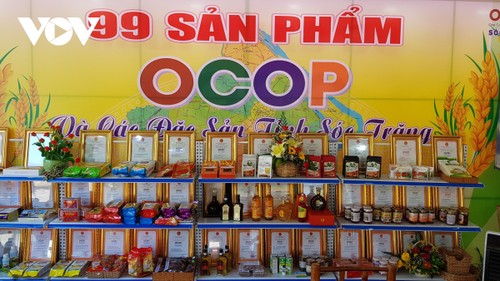 Soc Trang’s OCOP products Soc Trang’s OCOP products |
52 enterprises, cooperatives and family businesses in Soc Trang now have OCOP certified products. Specializing in custard-apple processing, Cam Thieu Company in Nga Nam town is one of them.
To have qualified items, the Company has invested in infrastructure to meet quality, food safety, and hygiene standards, whilst also using safe materials which are planted in accordance to VietGAP regulations. Its custard-apple tea products have been rated 4 stars, and are available at a number of supermarkets across Vietnam .
Due to the development of localized production, Cam Thieu have signed contracts to buy all custard-apple fruits from local growers and generated jobs in their local area.
In addition, they have been working with several trading partners to export the products to China and South Korea, according to Duong Minh Trung, the Company’s Director.
“In order to export products, it’s necessary to have certificates that meet standards. With the support of the Departments of Science, Technology, Agriculture, Industry, and Trade, Cam Thieu has obtained the ISO 2000 certification,” said Trung, adding, “Industry stimulus programs have also supported us with machinery and equipment. But to increase the custard-apple products brand awareness, it’s essential to build a more standardized material zone, alongside the regulations set by importers.”
Pham Thi Moi is the owner of a facility which processes three-striped crab in Soc Trang city. She said that since the salted crab became an OCOP product, its reputation has greatly increased.
The wetland-dwelling three-striped crab is most popular in the southern coastal provinces, where locals consider the creature a delicacy.
Moi told VOV: “After joining the OCOP program, our three-striped crab products have a greater brand awareness and market share. The achievement is a result of our own efforts to advertise the products, as well as the trade promotion programs by local government departments and agencies.”
She noted, “My facility has more than 30 agents inside and outside the province, with revenue growing by about 30%. Being certified by the OCOP program helps our products gain higher prestige, and therefore more customers.”
 At the conference to connect the supply, production, and consumption of OCOP products At the conference to connect the supply, production, and consumption of OCOP products |
To make the OCOP program effective, over the past 2 years Soc Trang has prioritized innovation in highly processed products and local, traditional goods.
Support has also been given to help build business plans that develop commodities by value chain. There’s also support available in the application of science and technology, vocational training, and capacity building.
Soc Trang has worked to stimulate consumption, develop production, and expand markets. Lam Hoang Nghiep, Deputy Chairman of the provincial People’s Committee, said, “Soc Trang now has 99 OCOP products made by 52 enterprises, cooperatives and business households, 24 of which are ranked 4-star level, with the rest certified 3 stars.”
“We have a detailed plan to raise the ranking of 3-star products, in order to meet domestic and international demands. We will continue to create more products meeting OCOP standards, and fully exploiting the advantages of local production, especially in agriculture,” said Nghiep.
Soc Trang province aims to standardize at least 35 additional OCOP products in the next 5 years.
It will also boost trade promotion and improve the quality of human resources available for managers. An increase in the production and trading capacity of enterprises and cooperatives will help improve the local economy and living standards.